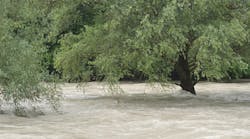When one thinks of a blanket, one thinks of a covering made of cloth, generally used on a bed, for the purpose of keeping warm. While erosion control blankets—also known as rolled erosion control products (RECPs)—are not placed on a bed consisting of a mattress and sheets, they are used to provide erosion control and facilitate vegetation establishment on a “bed” of seeded soil. One attribute of an RECP is its ability to moderate soil temperatures and warm the soil onto which it has been placed during colder temperatures.
From Oct. 28 through Nov. 11, 2011, East Coast Erosion Blankets conducted a study to determine whether blankets do actually keep the soil warm at night. The study was conducted at the East Coast Erosion Blankets manufacturing facility in Strausstown, Pa., located in northwestern Berks County. Five test plots measuring 7.5 ft by 20 ft and with a minimal slope were graded to provide a uniform, smooth surface. Grass seed was applied to the five test plots and various types of RECPS were stapled to the test plots. One test plot was kept in a bare soil condition and not covered with an RECP. The remaining four test plots were covered with a double net straw RECP, a double net straw/coconut RECP, a double net excelsior RECP and a double net coconut RECP.
Ambient air temperature was measured at 6 a.m. each day during the study period. Additionally, four randomly selected spots within each test plot were also measured at the same time with a Taylor 9842 digital soil thermometer.
The average ambient air temperature at 6 a.m. for 15 consecutive days was 35.07°F +7.8°F during the study period. A review of the historical average monthly temperatures for Berks County, Pa., revealed that the mean minimum temperature for the month of October was 41.9°F, and the mean minimum temperature for November was 34.1°F. The average ambient air temperature of 35°F for the study period that extended from October into November fell within the historical range of the mean minimum temperatures for Berks County.
The average soil temperature for the bare soil test plot was 37.69°F +2.6°F. The similarity in ambient air temperature and the bare soil temperature illustrated the impact of cooler temperatures on bare soil during the nighttime period. The test plot that was covered with the double net straw RECP recorded an average soil temperature of 42.91°F +5.9°F, an increase 5.21° degrees warmer than the bare soil test plot and an increase of 7.84°F degrees warmer than the ambient air temperature—seeming to indicate that a double net straw RECP does warm the soil on cold nights.
In the fall of 2013, the Pennsylvania Department of Transportation was engaged in a bridge replacement project to allow for future widening of Interstate Highway I-78 from a four-lane divided highway to a six-lane divided highway (S.R. 0501, Section 01B over Interstate 78 Interchange Improvement Project). The project site was located within 10 miles of the East Coast Erosion Blankets facility. The project created 3:1 (H:V) embankment slopes that were protected with straw RECPS similar to the ones utilized during the soil temperature study conducted in 2011. The “Erosion Control & Conservation Plantings on Noncropland” publication issued by the Penn State College of Agricultural Sciences recommends the planting of cool-season grass species before the recognized “first frost” date. In south-central Pennsylvania, that date is recognized as Oct. 15. Hilltop Service Inc. was a subcontractor on the project and was responsible for establishing vegetation on the shoulder embankments. Hilltop Service Inc. seeded the embankments and installed an East Coast Erosion Blanket straw RECP on Oct. 23, 2013.
The straw RECP demonstrated its ability to warm the soil and enhanced the establishment of a full stand of vegetation within 26 days of installation and during the “non-growing” season.
John Ravert is director of technical services for East Coast Erosion Blankets LLC and can be contacted at [email protected].




